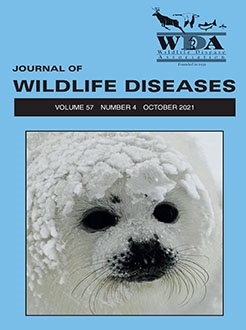A lysosomal storage disease, identified as a mucopolysaccharidosis (MPS), was diagnosed in a free-living Kaka (Nestor meridionalis), an endemic New Zealand parrot, which exhibited weakness, incoordination, and seizures. Histopathology showed typical colloid-like cytoplasmic inclusions in Purkinje cells and many other neurons throughout the brain. Electron microscopy revealed that storage bodies contained a variety of linear, curved, or circular membranous profiles and electron-dense bodies. Because the bird came from a small isolated population of Kaka in the northern South Island, a genetic cause was deemed likely. Tandem mass spectrometry revealed increased levels of heparan sulfate-derived disaccharides in the brain and liver compared with tissues from controls. Enzymatic assays documented low levels of iduronate-2-sulfatase activity, which causes a lysosomal storage disorder called MPS type II or Hunter syndrome. A captive breeding program is currently in progress, and the possibility of detecting carriers of this disorder warrants further investigation.
How to translate text using browser tools
11 October 2021
MUCOPOLYSACCHARIDOSIS II (MPS II) IN A FREE-LIVING KAKA (NESTOR MERIDIONALIS) IN NEW ZEALAND
Robert D. Jolly,
Stuart A. Hunter,
Maurice R. Alley,
Barbara M. King,
Adeline A. Lau,
Paul J. Trim,
Marten F. Snel,
Kim M. Hemsley
ACCESS THE FULL ARTICLE

Journal of Wildlife Diseases
Vol. 57 • No. 4
October 2021
Vol. 57 • No. 4
October 2021
Enzymology
Hunter syndrome
lysosomal storage disease
mass spectrometry
mucopolysaccharidosis II
parrot
ultrastructure




